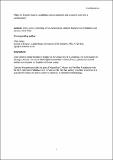Files in this item
An English lecturer, a palliative care practitioner, and an absent poet have a confabulation
Item metadata
| dc.contributor.author | Jones, Chris | |
| dc.contributor.author | Macpherson, Catriona | |
| dc.date.accessioned | 2014-04-24T16:01:01Z | |
| dc.date.available | 2014-04-24T16:01:01Z | |
| dc.date.issued | 2014-07-09 | |
| dc.identifier | 113248888 | |
| dc.identifier | ede49ce7-4504-4172-b483-432ceebd8467 | |
| dc.identifier | 84904352046 | |
| dc.identifier.citation | Jones , C & Macpherson , C 2014 , ' An English lecturer, a palliative care practitioner, and an absent poet have a confabulation ' , Cultural Studies - Critical Methodologies , vol. 14 , no. 4 , pp. 361-368 . https://doi.org/10.1177/1532708614530307 | en |
| dc.identifier.issn | 1552-356X | |
| dc.identifier.uri | https://hdl.handle.net/10023/4606 | |
| dc.description.abstract | The possibilities for developing the poet Douglas Dunn’s archive (which includes the drafts and manuscripts for his collection Elegies, dealing with the terminal illness and death of the poet’s wife from cancer) for therapeutic benefit are explored by an English lecturer (C.J.) and a palliative care practitioner (C.M.). This has led us to explore the potential benefit of this resource for health practitioners working with those affected by cancer and other life-limiting conditions. This article offers a “written conversation” (an acknowledged oxymoron of genre) about working with the themes of death and loss: a conversation which includes Douglas Dunn, who was not actually there. We reflect on the value of this “confabulation” as methodological inquiry, and its potential influence on practice. Thus, an example of “creative writing” (the confabulation) becomes a piece of research into methodology regarding the use of “creative writing” resources (the poetry archive) in palliative health care. | |
| dc.format.extent | 8 | |
| dc.format.extent | 463862 | |
| dc.language.iso | eng | |
| dc.relation.ispartof | Cultural Studies - Critical Methodologies | en |
| dc.rights | Copyright 2014, the authors. This is the accepted version of this article. The published version of record (c) SAGE Publications is available at: doi: 10.1177/1532708614530307 | en |
| dc.subject | Cancer | en |
| dc.subject | Collaborative writing | en |
| dc.subject | Dying | en |
| dc.subject | Death and bereavement | en |
| dc.subject | Douglas Dunn | en |
| dc.subject | Literary archives | en |
| dc.subject | Palliative care | en |
| dc.subject | Poetry | en |
| dc.subject | Therapeutic writing | en |
| dc.subject | PN0080 Criticism | en |
| dc.subject | SDG 3 - Good Health and Well-being | en |
| dc.subject.lcc | PN0080 | en |
| dc.title | An English lecturer, a palliative care practitioner, and an absent poet have a confabulation | en |
| dc.type | Journal article | en |
| dc.contributor.sponsor | Carnegie Trust | en |
| dc.contributor.institution | University of St Andrews.School of English | en |
| dc.contributor.institution | University of St Andrews.St Andrews Institute of Medieval Studies | en |
| dc.identifier.doi | 10.1177/1532708614530307 | |
| dc.description.status | Peer reviewed | en |
| dc.identifier.grantnumber | en |
This item appears in the following Collection(s)
Items in the St Andrews Research Repository are protected by copyright, with all rights reserved, unless otherwise indicated.

